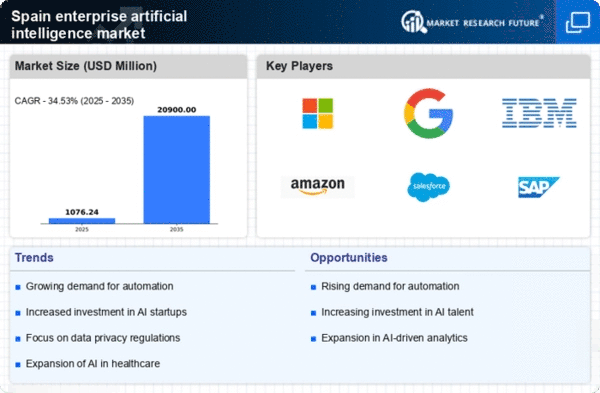Rising Demand for Automation Solutions
The enterprise artificial-intelligence market in Spain experiences a notable surge in demand for automation solutions across various sectors. Companies are increasingly adopting AI technologies to streamline operations, enhance productivity, and reduce operational costs. According to recent data, the automation market in Spain is projected to grow at a CAGR of 15% over the next five years. This trend indicates a strong inclination towards integrating AI-driven automation tools, which are seen as essential for maintaining competitive advantage. As organizations seek to optimize their workflows, the enterprise artificial-intelligence market is likely to benefit significantly from this growing demand for automation, leading to increased investments in AI technologies.
Expansion of Data-Driven Decision Making
In Spain, the enterprise artificial-intelligence market is witnessing a paradigm shift towards data-driven decision making. Organizations are increasingly recognizing the value of leveraging AI to analyze vast amounts of data for informed strategic choices. This trend is supported by the fact that approximately 70% of Spanish companies are investing in data analytics and AI solutions to enhance their decision-making processes. The ability to derive actionable insights from data not only improves operational efficiency but also fosters innovation. Consequently, the enterprise artificial-intelligence market is positioned to thrive as businesses prioritize data-centric approaches to drive growth and competitiveness.
Growing Focus on Cybersecurity Solutions
As the enterprise artificial-intelligence market evolves in Spain, there is an increasing emphasis on cybersecurity solutions powered by AI technologies. With the rise in cyber threats, organizations are turning to AI to bolster their security measures. Recent statistics indicate that cyberattacks have surged by 30% in the past year, prompting businesses to invest in AI-driven cybersecurity tools. These solutions not only enhance threat detection but also enable proactive responses to potential breaches. Consequently, the enterprise artificial-intelligence market is likely to expand as companies prioritize the integration of AI in their cybersecurity strategies to safeguard sensitive data and maintain operational integrity.
Government Initiatives Supporting AI Development
The Spanish government plays a pivotal role in fostering the enterprise artificial-intelligence market through various initiatives aimed at promoting AI research and development. Recent policies have allocated substantial funding, estimated at €600 million, to support AI projects and encourage collaboration between public and private sectors. These initiatives are designed to enhance Spain's position as a leader in AI technology within Europe. By creating a conducive environment for innovation, the government is likely to stimulate growth in the enterprise artificial-intelligence market, attracting both domestic and international investments in AI-driven solutions.
Integration of AI in Customer Experience Management
The enterprise artificial-intelligence market in Spain is significantly influenced by the integration of AI technologies in customer experience management. Businesses are increasingly utilizing AI to personalize interactions, predict customer behavior, and enhance service delivery. Recent surveys indicate that 65% of Spanish consumers prefer brands that leverage AI for personalized experiences. This growing expectation drives companies to adopt AI solutions that improve customer engagement and satisfaction. As a result, the enterprise artificial-intelligence market is poised for growth, as organizations recognize the importance of AI in delivering exceptional customer experiences and fostering brand loyalty.
















